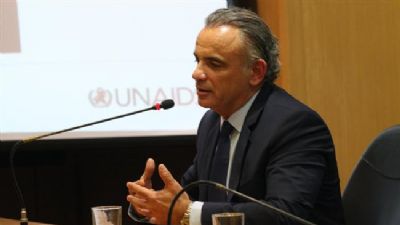"Code Blue Campaign, an advocacy organization that tracks sexualized violence by U.N. personnel, accused the institution of mishandling recent accusations made against Luiz Loures, the deputy executive director of the U.N. Programme on HIV/AIDS (UNAIDS). The Guardian later reported that an internal investigation had acquitted Loures, who is also a U.N. assistant secretary-general, of any wrongdoing.
Documents pertaining to the investigation were also obtained by Foreign Policy. They offer a rare window into the way the United Nations has handled such cases in the recent past - procedures that fall short of basic forensic standards and allow room for political interference, among other flaws. The problems exposed by the reports run deep and are unlikely to be solved by [UN Secretary-General] Guterres's newly announced reforms...
One evening in the spring of 2015, Loures and a group of UNAIDS employees from around the world gathered for a conference in East Asia. During cocktails, Loures found himself in conversation with one of his female employees. According to the documents, the two talked shop until the woman said she needed to go back to her room to work on her presentation for the next day, after which they entered an elevator. Both parties agree on this portion of the evening.
Their accounts diverge, however, about what happened next. The accuser alleges that Loures, her superior, was lounging against the back wall of the elevator when he suddenly lunged at her, kissing her and grabbing her breasts. When the elevator reached his floor, the employee claims that Loures attempted to pull her to his room for sex. The accuser claims that she struggled, ultimately pulling her arm out of his grasp as the elevator doors closed...
According to Swanson, the complaint may have been dismissed because the United Nations uses 'unrealistic standards of proof' - namely, those applied by the U.N. Dispute Tribunal, which requires 'clear and convincing evidence' to prove misconduct, a higher standard than the 'preponderance of the evidence' required in most civil litigation in the United States. The statute of the dispute tribunal also doesn't stipulate what sorts of evidence would be considered admissible, leaving it to the U.N. judge to determine what he or she 'deems necessary.'
As a result of such rules, Swanson says, 'there's an accountability vacuum, because we are very often unable to provide proof to the requisite standard.'...
What's clear is that the outcome of the existing sexual misconduct investigation against Loures left the accuser with little recourse. [Peter] Gallo, the former U.N. investigator, says that once a sexual misconduct case is stamped 'denied' by internal investigators, 'to the U.N. she's not a victim, she's a hysterical screaming girlie with nothing to complain about.' Nor can the accuser easily turn to national courts for help, since that would first require convincing the secretary-general to waive the official's legal immunity and finding a judge willing to consider the case within his or her jurisdiction.
The most disturbing aspect of the Loures investigation is that the problems associated with it probably weren't an isolated episode. A U.N. 'staff engagement' survey conducted in December and leaked on Feb. 28 reports that 'Approximately half of UN staff, doubt that people are treated with respect, or held accountable for ethical behaviour, and lack confidence that they can report misconduct without retaliation.' Even the U.N.'s top investigator admits that there are major problems throughout the organization. 'We've got chronic underreporting,' says Swanson. 'We've got management that gives the impression that sometimes they don't know what to do. Potentially stuff is being covered up and not being reported.'
It's unlikely the reforms unveiled last week by Guterres will be adequate to the scale of the challenge..."
March 8, 2018
U.N. Sexual Assault Investigations Die in Darkness

Luiz Loures, deputy executive director of UNAIDS
Date
March 8, 2018
Title
U.N. Sexual Assault Investigations Die in Darkness, Foreign Policy
Author(s)
Lauren Wolfe
Original Source
